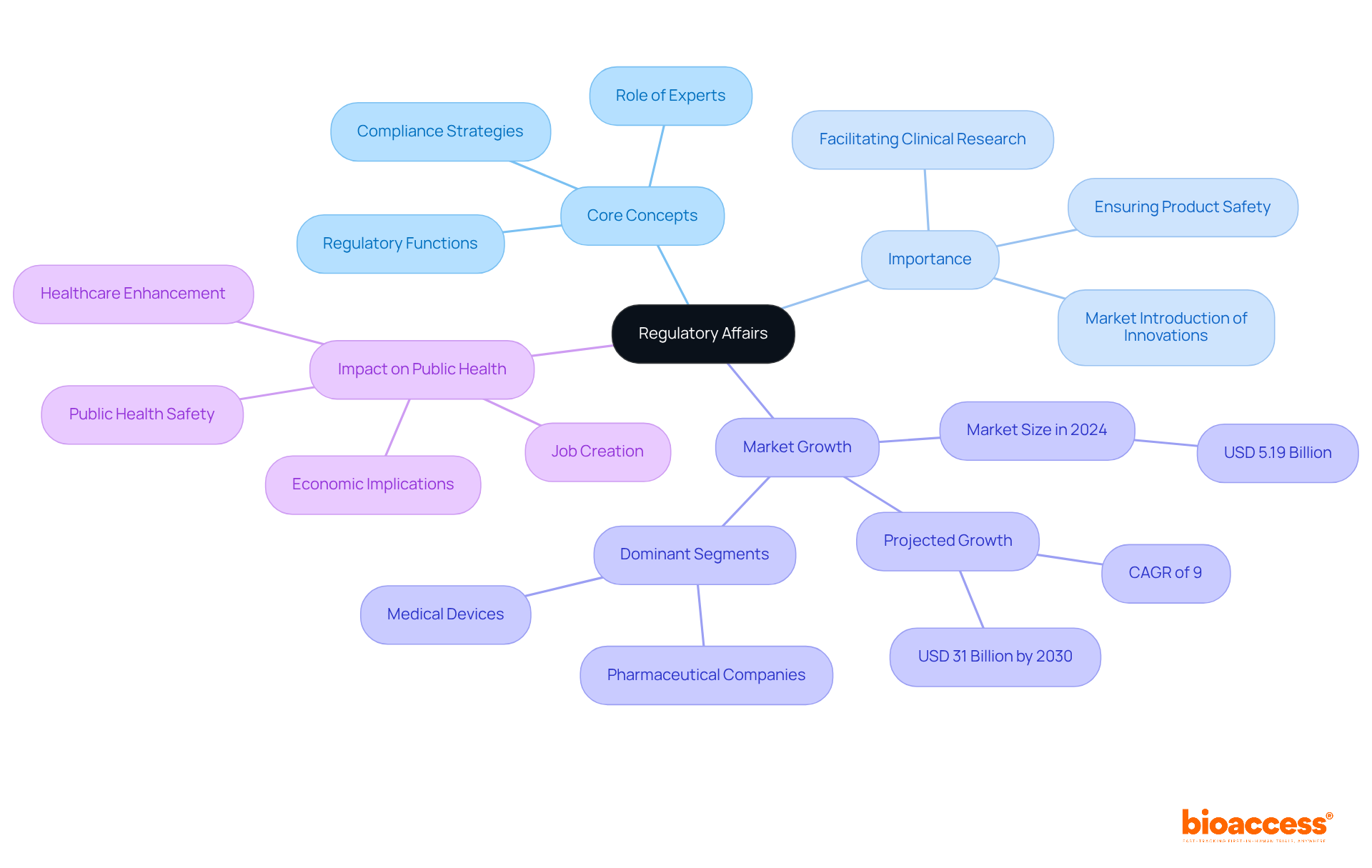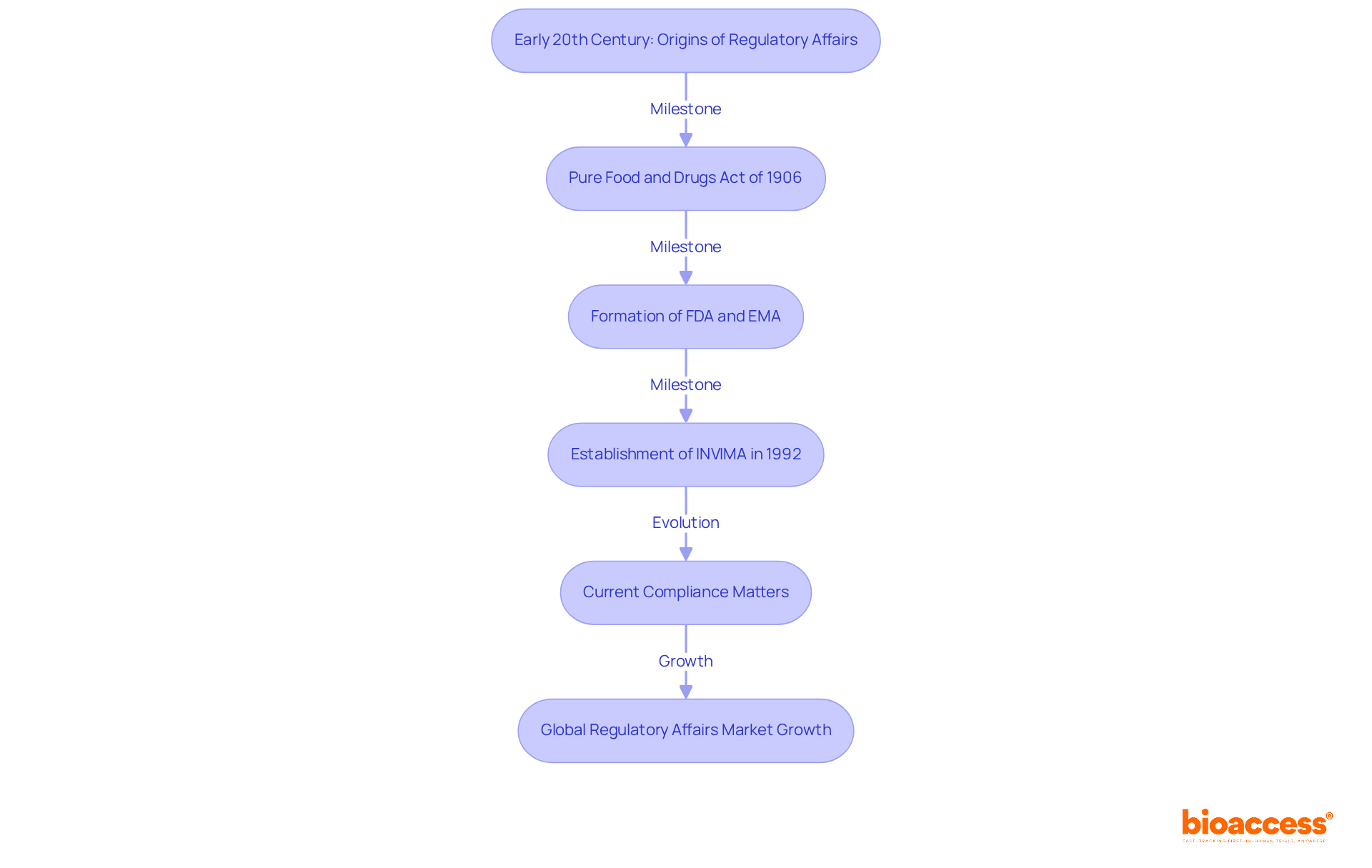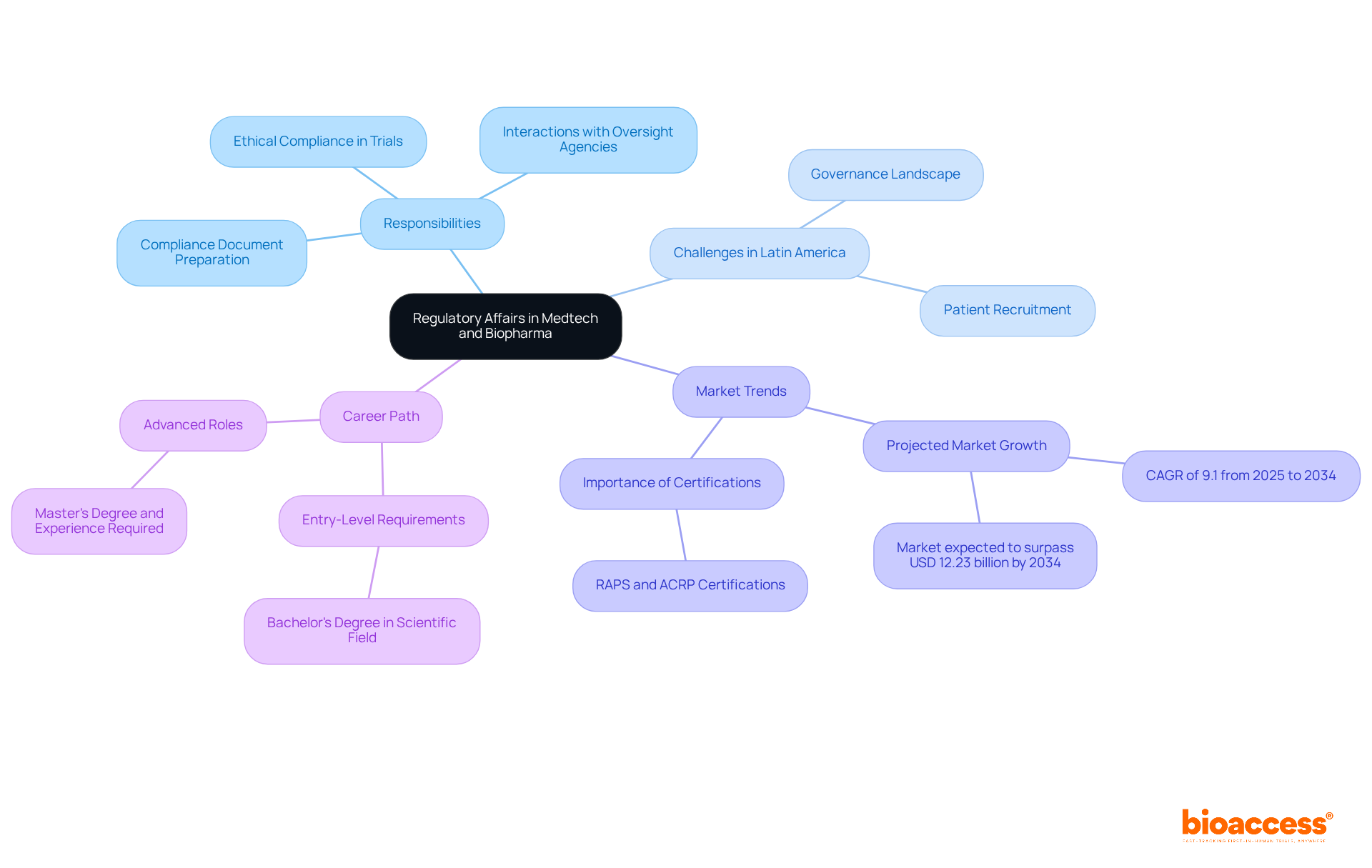


Regulatory affairs represents a vital multidisciplinary field dedicated to ensuring that healthcare products, including pharmaceuticals and medical devices, adhere to regulatory standards that safeguard public health. This article underscores the essential role of regulatory affairs professionals who expertly navigate complex compliance processes. They facilitate the introduction of innovative medical products while upholding safety and efficacy standards in the face of evolving regulations and technological advancements.
Regulatory affairs are pivotal in the healthcare landscape, ensuring that pharmaceuticals, medical devices, and biologics adhere to stringent safety and efficacy standards.
With the demand for compliance professionals surging in a market projected to reach USD 31 billion by 2030, grasping the intricacies of this field is essential for clinical research leaders.
However, as regulations evolve rapidly and innovative technologies introduce complexities, organizations must navigate these challenges effectively while safeguarding public health. This underscores the necessity for a robust understanding of regulatory frameworks and the strategies that can be employed to address them.
What is regulatory affairs encompasses the regulatory functions (RA), which represent a crucial multidisciplinary domain ensuring that healthcare products—including pharmaceuticals, medical devices, and biologics—comply with the regulations and laws overseeing their development, testing, and marketing. The primary goal of oversight is to protect public health by guaranteeing that products are safe, effective, and of high quality. Experts in this field serve as an essential connection between the healthcare sector and oversight bodies, assisting companies in navigating the complex compliance and approval procedures while understanding what is regulatory affairs.
The significance of governance in clinical research cannot be overstated. It plays a pivotal role in facilitating the timely introduction of innovative medical products to the market while upholding stringent safety standards. In 2024, the clinical studies sector represented the largest revenue portion in the U.S. compliance market, illustrating the growing need for adherence amid changing regulations. As the market is expected to expand at a compound annual growth rate (CAGR) of nine percent, reaching USD 31 billion by 2030, the demand for skilled compliance professionals will continue to rise.
Effective compliance strategies in the Medtech and Biopharma fields frequently include proactive interaction with oversight authorities and a comprehensive understanding of what is regulatory affairs. For instance, bioaccess® excels in feasibility studies and site selection, ensuring compliance with country requirements and expediting trial setup and approval processes. The organization’s methods, including obtaining official approval in 6-8 weeks compared to the usual 6-12 months in the U.S. and EU, enable quicker patient enrollment, particularly in treatment-naive cardiology or neurology groups, which can be accomplished 50% faster than sites in the West. This growth underscores the importance of efficient oversight strategies in addressing the challenges presented by innovative technologies.
Furthermore, the impact of governance extends beyond mere adherence; it directly affects public health safety and local economies through job creation and healthcare enhancement. With the U.S. compliance market valued at USD 5.19 billion in 2024 and expected to reach USD 12.23 billion by 2034, the rising scrutiny from authorities and the increasing trend of outsourcing compliance services emphasize the vital role these experts play in ensuring the safety and effectiveness of medical products. As the healthcare landscape evolves, the significance of compliance in safeguarding public health will remain paramount.

The origins of oversight affairs can be traced back to the early 20th century, marked by significant milestones such as the Pure Food and Drugs Act of 1906 in the United States, which aimed to eliminate the sale of misbranded or adulterated foods and drugs.
Over the years, this domain has evolved considerably, influenced by public health emergencies, technological advancements, and the increasing complexity of medical products.
The formation of regulatory bodies like the U.S. Food and Drug Administration (FDA) and the European Medicines Agency (EMA) has formalized the oversight of drug and device approval processes.
In Colombia, the INVIMA (Colombia National Food and Drug Surveillance Institute), established in 1992 under the Ministry of Health and Social Protection, plays a crucial role in this landscape.
INVIMA is tasked with inspecting and supervising the marketing and manufacturing of health products, ensuring compliance with health standards, and providing medical approval for the import and export of products.
Its Directorate for Medical Devices and other Technologies oversees the regulation of medical devices, recommending technical standards for manufacturing, marketing, and quality assurance.
Recognized as a Level 4 regional reference health authority by the Pan American Health Organization/World Health Organization, INVIMA's classification underscores its competence in ensuring the safety, efficacy, and quality of medicines.
Currently, compliance matters encompass a wide array of activities, from preclinical research to post-market monitoring, illustrating the dynamic nature of healthcare innovation.
The global compliance market, estimated at approximately USD 15.97 billion in 2024, is projected to reach about USD 36.12 billion by 2034, indicating robust growth driven by the complexities of the life sciences industry.
This evolution emphasizes the critical role of oversight in maintaining the safety and effectiveness of medical products while fostering innovation within the healthcare environment.

Experts in compliance affairs are essential in the Medtech and Biopharma sectors, as they ensure that products meet established standards throughout their lifecycle, which is central to understanding what is regulatory affairs. Their primary responsibilities include:
This encompasses conducting thorough risk evaluations, developing effective compliance strategies, and providing guidance on labeling and marketing obligations.
In Latin America, navigating the governance landscape presents distinct challenges and opportunities. Companies like bioaccess® are at the forefront as contract research organizations, facilitating medical device clinical trials across the region. They connect innovative Medtech, Biopharma, and Radiopharma startups with leading clinical research sites, ensuring that compliance approvals, patient recruitment, and trial data management are executed efficiently. This strategic approach accelerates clinical trials, enabling startups to advance to the next phase of their studies significantly faster.
The current employment landscape for compliance affairs professionals is robust, with the U.S. compliance affairs market projected to surpass USD 12.23 billion by 2034, reflecting a compound annual growth rate (CAGR) of 9.1% from 2025 to 2034. Entry-level positions typically require a bachelor's degree in a scientific or healthcare-related field, while advanced roles necessitate a master's degree and substantial experience. Certifications from organizations such as RAPS or ACRP can notably enhance career prospects, rendering candidates more competitive in this expanding field.
Effective oversight strategies in Biopharma often incorporate case studies that highlight the importance of compliance management in clinical trials. For instance, what is regulatory affairs highlights the importance of ensuring adherence to regulatory requirements for the successful initiation and ongoing progress of clinical trials, as underscored in numerous studies. These experts adeptly navigate the complex legal landscape, which is essential for understanding what is regulatory affairs, ensuring that innovative products reach the market efficiently while safeguarding public health. By fostering collaboration among researchers, manufacturers, and oversight organizations, compliance professionals play an essential role in advancing healthcare innovations, particularly in developing markets like Latin America.

The oversight environment is in a state of constant evolution, shaped by technological advancements, shifting public health priorities, and changes in governance policies. A significant trend is the growing dependence on digital tools for compliance submissions, which simplifies processes and improves efficiency. Statistics indicate that the use of digital solutions in compliance submissions has enhanced turnaround times by as much as 30%. Furthermore, the integration of real-world evidence in clinical trials is gaining traction, enabling more robust data collection and analysis that reflects actual patient experiences.
However, compliance affairs professionals encounter significant challenges in this rapidly changing environment. Navigating complex global regulations remains a daunting task, particularly as different regions implement varying standards and requirements. The swift pace of innovation in Medtech and Biopharma complicates compliance efforts, as professionals must stay informed about emerging technologies and their implications for legal frameworks. Moreover, addressing public concerns regarding safety and efficacy is crucial, necessitating transparent communication and thorough evaluation processes.
Practical instances underscore these challenges: companies have faced delays in product approvals due to unexpected compliance obstacles, emphasizing the necessity for proactive strategies in planning. As the industry continues to adapt, understanding what is regulatory affairs will be pivotal in ensuring that new therapies and technologies are developed responsibly and effectively, ultimately benefiting patient outcomes.

Regulatory affairs are pivotal in guaranteeing that healthcare products are safe, effective, and compliant with established laws and regulations. This multidisciplinary field acts as a crucial link between the healthcare industry and regulatory bodies, facilitating the approval and market entry of innovative medical products while prioritizing public health. As the demand for skilled regulatory professionals continues to surge, grasping the complexities of this domain becomes essential for clinical research leaders.
This article has explored key insights into the evolution, significance, and responsibilities tied to regulatory affairs. From historical milestones to current trends influencing the Medtech and Biopharma sectors, the regulatory landscape is dynamic and ever-evolving. The discussion underscored the importance of proactive compliance strategies, the role of professionals in navigating intricate regulations, and the influence of technological advancements on the efficiency of compliance processes.
As the healthcare environment transforms, the implications of regulatory affairs extend beyond mere compliance to encompass broader public health benefits and economic growth. Embracing effective governance principles is vital for fostering innovation and ensuring that new therapies and technologies are developed responsibly. For clinical research leaders, prioritizing regulatory affairs as a core component of their strategy is not only a necessity but also a commitment to enhancing patient outcomes and advancing the healthcare sector as a whole.
What are regulatory affairs?
Regulatory affairs encompass the regulatory functions that ensure healthcare products, including pharmaceuticals, medical devices, and biologics, comply with laws and regulations governing their development, testing, and marketing.
What is the primary goal of regulatory affairs?
The primary goal of regulatory affairs is to protect public health by ensuring that healthcare products are safe, effective, and of high quality.
Why is governance important in clinical research?
Governance is crucial in clinical research as it facilitates the timely introduction of innovative medical products to the market while maintaining stringent safety standards.
What is the projected growth of the clinical studies sector in the U.S. compliance market?
The clinical studies sector is projected to expand at a compound annual growth rate (CAGR) of nine percent, reaching USD 31 billion by 2030.
How can compliance strategies in the Medtech and Biopharma fields be effective?
Effective compliance strategies often involve proactive interaction with oversight authorities and a comprehensive understanding of regulatory affairs, enabling quicker approvals and patient enrollment.
What advantages does bioaccess® provide in terms of compliance?
Bioaccess® excels in feasibility studies and site selection, achieving official approval in 6-8 weeks, which is significantly faster than the usual 6-12 months in the U.S. and EU.
How does governance impact public health and local economies?
Governance not only ensures adherence to regulations but also enhances public health safety and contributes to local economies through job creation and healthcare improvements.
What is the projected value of the U.S. compliance market by 2034?
The U.S. compliance market is valued at USD 5.19 billion in 2024 and is expected to reach USD 12.23 billion by 2034.
What trends are influencing the demand for compliance professionals?
Rising scrutiny from authorities and the increasing trend of outsourcing compliance services are driving the demand for skilled compliance professionals in the healthcare sector.